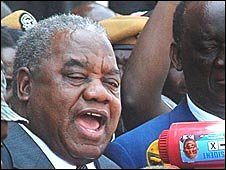
Zambia's new president Rupiah Banda, who was sworn in on Sunday, November 2, 2008. He served as vice-president prior to the death of former head-of-state Levy Mwanamasa.
Originally uploaded by Pan-African News Wire File Photos
Thursday, 16 Sep 2010
The International Monetary Fund (IMF) has said that Zambia’s economy is performing well with Gross Domestic Product (GDP) projected at 6.6 per cent this year.
This is after an IMF mission visited Lusaka from September 2 to15, 2010 to conduct discussions for the fifth review under the Extended Credit Facility.
According to a statement released by the IMF yesterday, mission chief for Zambia George Tsibouris said Zambia’s economy had been boosted by a record bumper harvest, a rebound in tourism, continued copper price increments and construction.
Mr Tsibouris said this year’s bumper harvest had helped bring down inflation to 8.2 per cent at the end of August while the trade balance had been in surplus for 12 consecutive months, primarily as a result of strong copper exports and that the current account deficit was projected to narrow to 2.4 per cent of GDP.
He said international reserves remained strong at about 3.3 months of imports and that there were signs of improved financial sector conditions with credit to the private sector slowly picking although non-performing loans remained high.
"Macro-economic policy implementation has contributed to strong economic performance so far in 2010. As at the end of July 2010, the fiscal programme is broadly in line with original plans," he said.
He said any repercussion on the exchange rate stemming from the recent economic difficulties in Europe had been handled well by the Bank of Zambia, which had managed liquidity conditions with a view to containing inflation while providing an enabling environment for robust economic activity.
"Growth is expected to remain strong in 2011 and over the medium term. There is some risk of rising inflation towards the end of 2010 and into 2011, given the onset of the agricultural season and still high non-food prices," he said.
Mr Tsibouris said that the current account deficit was expected to widen to almost four per cent of GDP in 2011, as large energy and infrastructure projects with high import content come on line.
No comments:
Post a Comment